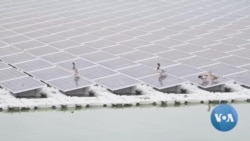Floating solar technology begins to take hold in North America.
Welcome to VOA Asia Weekly. I'm Chris Casquejo in Washington. That story is coming up, but first, your top headlines.
The United States is not discussing joint nuclear exercises with South Korea, President Joe Biden said Monday. South Korean President Yoon Suk-yeol had said that Seoul and Washington are discussing possible joint exercises using U.S. nuclear assets.
China is ready to resume oil and gas talks and manage maritime issues in the South China Sea "cordially" with the Philippines, Chinese President Xi Jinping said on Wednesday, according to Chinese state television. Xi was speaking to his Philippines counterpart Ferdinand Marcos Junior, who was on a three-day visit to Beijing.
China objected Tuesday to new COVID-19 testing requirements for travelers from China that have been put in place by a number of countries, saying the measures “lack scientific basis.” The U.S., Britain, France, Canada, South Korea, Spain, and Qatar are among the countries that have announced testing requirements for travelers from China.
Myanmar's ruling military junta held a parade Wednesday marking 75 years of independence from British colonial rule. The celebration came amid ongoing conflict with opposition groups across the country since seizing power in a military coup two years ago.
South Korea’s military on Monday released footage of a successful test flight of its solid-propellant space launch vehicle, another step forward in its space program. The test flight took place last week.
Former NATO secretary-general Anders Fogh Rasmussen met with Taiwan’s President Tsai Ing-wen Wednesday in Taipei to discuss how democracies in the world can cooperate to counter the expansion of authoritarianism, especially in China, amid rising tensions between Taiwan and mainland China.
Solar panels on rooftops and on the ground are no longer unusual in many parts of the world. But they also can be placed on bodies of water. As VOA’s chief national correspondent Steve Herman reports, the floating solar technology has taken off in Asia and Europe and is now beginning to heat up in North America.
One of the hottest innovations for the non-polluting generation of electricity is floating photovoltaics, or FPV, which involves anchoring solar panels in bodies of water, including lakes, reservoirs and seas.
Floating solar projects are even more attractive when they can be built on bodies of water adjacent to hydropower plants with existing transmission lines according to Sika Gadzanku, a researcher at the National Renewable Energy Laboratory in Colorado.
“So, instead of depending so much on hydro, now you can use more FPV and reduce your dependence on hydro during, like, very dry seasons — you use your floating solar photovoltaics.”
Five thousand solar panels now float on one of the wastewater ponds of the town of Windsor in California, says council member Deborah Fudge.
“They also provide 90 percent of the power that we need for all of the operations for treating wastewater, for all the operations at our corporation yard, and also for pumping our wastewater to the geysers, which is a geothermal field about 40 miles (64 kilometers) north.”
“This lake in Virginia is one of about 25,000 bodies of water in the United States identified by the government as suitable for FPV placement. Floating panels covering one-fourth the area of each of these sites would potentially generate nearly 10 percent of America’s energy needs.”
Steve Herman, VOA News, at Smith Lake in Stafford, Virginia
Visit voanews.com for the most up-to-date stories. You’re watching VOA Asia Weekly.
Ecuador, Japan, Malta, Mozambique and Switzerland got a formal welcome onto the United Nations Security Council on Tuesday, taking the two-year seats they won unopposed in June.
In a tradition that Kazakhstan started in 2018, the five countries’ ambassadors installed their national flags alongside those of other members outside the council chambers.
Countries often campaign for the council for years. Some 60 nations have never had a seat since the group’s formation in 1946.
Finally, the Consumer Electronics Show in Las Vegas opened Thursday.
After an unusually low turnout last year due to the COVID-19 pandemic and supply chain issues, organizers say CES is back in full swing.
This year’s theme is technology helping to address the world’s greatest challenges. Nearly one-third of the trade show’s exhibitors are from outside the U.S.
That’s all the time we have here on VOA Asia Weekly.
Thank you so much for joining us. I’m Chris Casquejo. Please be sure to tune in again next week.











